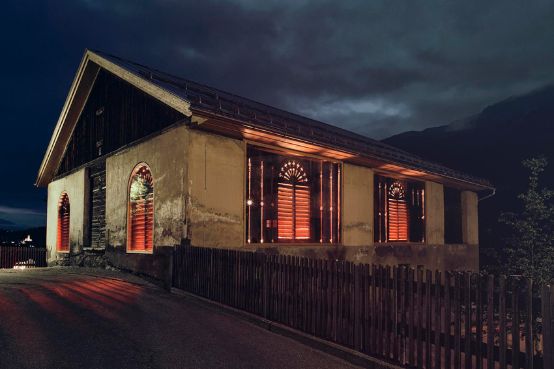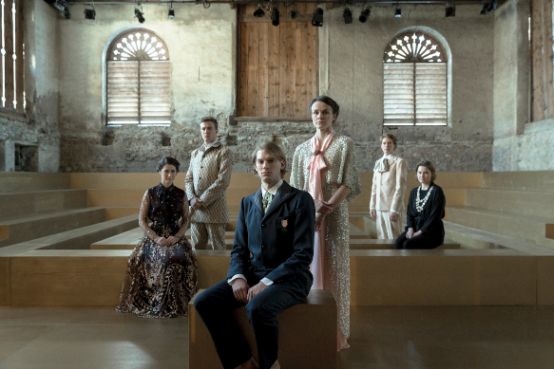World theater in the Carischs' café
A Grisons man and a tsar in Paris: in the barn of the Carisch family in Riom in the canton of Grisons, the Origen Festival tells of a quiet, unusual encounter.

Returning home: this has always been one of the most important themes at the Origen Festival Cultural - sometimes blatantly, sometimes more covertly. Giovanni Netzer, theologian, art and theater scholar, once returned to Surses, to his home town of Savognin, after his studies and set up a new, rather unique festival there in 2005 - with the help of local forces and at special venues in the region. It is called "Origen", meaning "origin". From the very beginning, the trilingualism of the valley was cultivated and the wonderful old churches of the region, Riom Castle, the dam wall of Marmorera and even the Julier Pass were used, occasionally moving to the Engadin or the Münstertal when the theme seemed appropriate, or even to the Unterland. The Christmas concerts are always held in Landquart, this Advent with Jan Dismas Zelenka, the extraordinary Bohemian baroque composer who worked at the Dresden court. The Missa Purificationis Beatae Virginis Mariae and the two-part Te Deum was performed by an ad hoc instrumental group and the festival's vocal ensemble, who gave a lively, varied performance of a high standard under Clau Scherrer. The space, the long factory hall of the Rhaetian Railway, was also an experience, with clear acoustics and a thousand candles lit during the performance.
Netzer always had the spaces in mind. In Landquart, this is above all atmospheric, but he just as often used the spectacular aspects of the scenery and changed our tourist view of it, for example when he told of the Flood at the reservoir. How threatening such a still body of water can suddenly appear - despite Martin Leuthold's magnificent garments, which have become a trademark of the festival. Subterranean forces were palpable. Incidentally, a red tower is currently being planned on the Julier Pass, a wooden Babylonian tower that will be performed in all seasons from 2017 and dismantled again in the fall of 2020.
The festival initially focused on spiritual, even biblical themes: Samson, the Messiah, Noah, later also stories about Charlemagne or from local history. The festival took place in summer, but Origen expanded noticeably, not only regionally, but also in terms of time, playing in winter, impressively in the snowy landscape of Lake Silvaplana. A few years ago, the Sontga Croush house in the middle of Riom was bought from the Menzing sisters, which functions as a festival center including a café - and finally the old barn belonging to it was renovated into a theater space that is available all year round.
The estate once belonged to the Carischs. The emigrant family had made their fortune abroad - like so many people from Graubünden: some of them returned home having become rich, others stayed abroad, accompanied by the "Malancuneia" that served as Origen's motto in summer 2016. It is the homesickness of the people of Graubünden who once worked as mercenaries in foreign services or went all over the world as confectioners, for example to Russia like the grandfather of composer Paul Juon or to Paris like the Carischs. This "nostalgia" resonated in the festival's song programs.
And in the theater productions. A trilogy was created about the Carischs, which has now been completed with "The Tsar in Paris". It is a strange and sad story, an intangible legend from the end of the 19th century: one evening, an unusual guest appears at Auguste Carisch's café with his entourage, the Tsar, who is in Paris with his wife. The couple, who have no male heir, would like to take Carisch's son to St. Petersburg and perhaps adopt him: He looks so much like the tsar. Carisch's wife prevents it.
-

- Photo: Benjamin Hofer
- Music theater "The Tsar in Paris"
Director Giovanni Netzer dispenses with stage sets and props: No café, no imperial pomp, no imagery. The audience sits around the action in the Clavadeira, the renovated barn. Auguste Carisch (Manuel Schunter) narrates the action, which is only hinted at in between: in the movements of the two dancers in particular (Riikka Läser, Torry Trautmann) and in the music (with singers Sybille Diethelm and Martin Mairinger and Alena Sojer on the piano). As is so often the case with Origen, movement and sound merge into one another. No further explanation is needed. The emotions are in the gestures - and in Reynaldo Hahn's chansons: their pastiche-like charm, as much fin de siècle as melancholy nostalgia for times gone by, fits perfectly into this turning point and deepens the feelings. As in the chamber opera "Benjamin" by Gion Antoni Derungs, which was performed at the same venue in 2015, a world theater of intimacy succeeds here. The impression is reinforced that Origen has also come into its own.
Further performances until March 15, 2017








